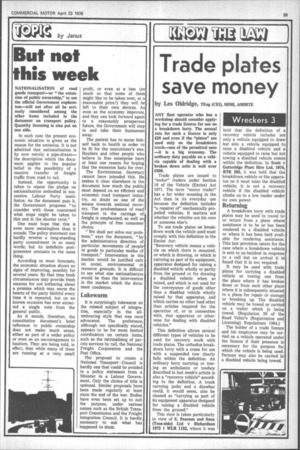But not this week
Page 57

If you've noticed an error in this article please click here to report it so we can fix it.
NATIONALISATION of road goods transport—or "the extension of public ownership," to use the official Government euphemism—will not after all be seriously considered among the other items included in the document on transport policy. Quantity licensing is also put on one side.
In each case the present economic situation is given as the reason for the omission. It is not admitted that nationalisation is by now merely a pipe-dreamthe description which the document applies to the popular belief in the possibility of a massive transfer of freight traffic from road to rail.
Instead, the opportunity is taken to repeat the pledge on nationalisation embodied in successive Labour Party manifestos. As the document puts it, the Government proposes "to consider with those concerned what steps might be taken to this end in the shorter term."
One must hope that this is even more meaningless than it sounds. The policy statement can hardly reverse a long-standing party commitment in so many words; but its indefinite postponement amounts to the same thing.
According to most forecasts, the economic situation shows no signs of improving, possibly for several years. By that time fresh circumstances may provide fresh reasons for not bothering about a promise which may warm the hearts of the party faithful every time it is repeated, but on no known occasion has ever attracted a single vote from the general public.
As it stands, therefore, the consultative document's brief reference to public ownership does not make much sense, either as part of a wider policy or even as an encouragement to hauliers. They are being told, in effect, that while many of them are running at •a very small profit, or even at a loss (so much so that some of them might like to be taken over, at a reasonable price!) they will be left to their own devices. As soon as the economy improves, and they can look forward again to a reasonably prosperous future, the Government will step in and take their businesses away.
The patient has to nurse himself back to health in order to be fit for the executioner's axe. Hauliers and other people who believe in free enterprise have at least one reason for hoping that the recession lasts for ever.
The Environment Secretary cannot have intended this. He makes it clear elsewhere in the document how much the public, must depend on an efficient and economic road transport industry, no doubt as one of the means towards national recovery. The predominance of road transport in the carriage of freight is emphasised, as well as the principle of free consumer choice.
"We shall not solve our problems," says the document, "by' the administrative direction of particular movements of people or goods to particular modes of transport." Intervention in the market would be justified only on social, environmental or resource grounds. It is difficult to see what else nationalisation would be than the intervention in the market which the document condemns.
Lukewarm
It is surprisingly lukewarm on the related subject of integration, especially in the allembracing style that was once advocated. The preference, although not specifically stated, appears to be for more limited coordination on certain items, such as the rationalising of parcels services by rail, the National Freight Corporation and the Post Office.
The proposal to create a National Transport Council is hardly one that could be avoided in a policy Statement from a Minister in a Labour Government. Only the choice of title is optional. Similar proposals have been made regularly at least since the end of the war. Bodies have even been set up to suit the purpose, under various names such as the British Transport Commission and the Freight Integration Council. It is hardly necessary to ask what has happened to them.
































































































